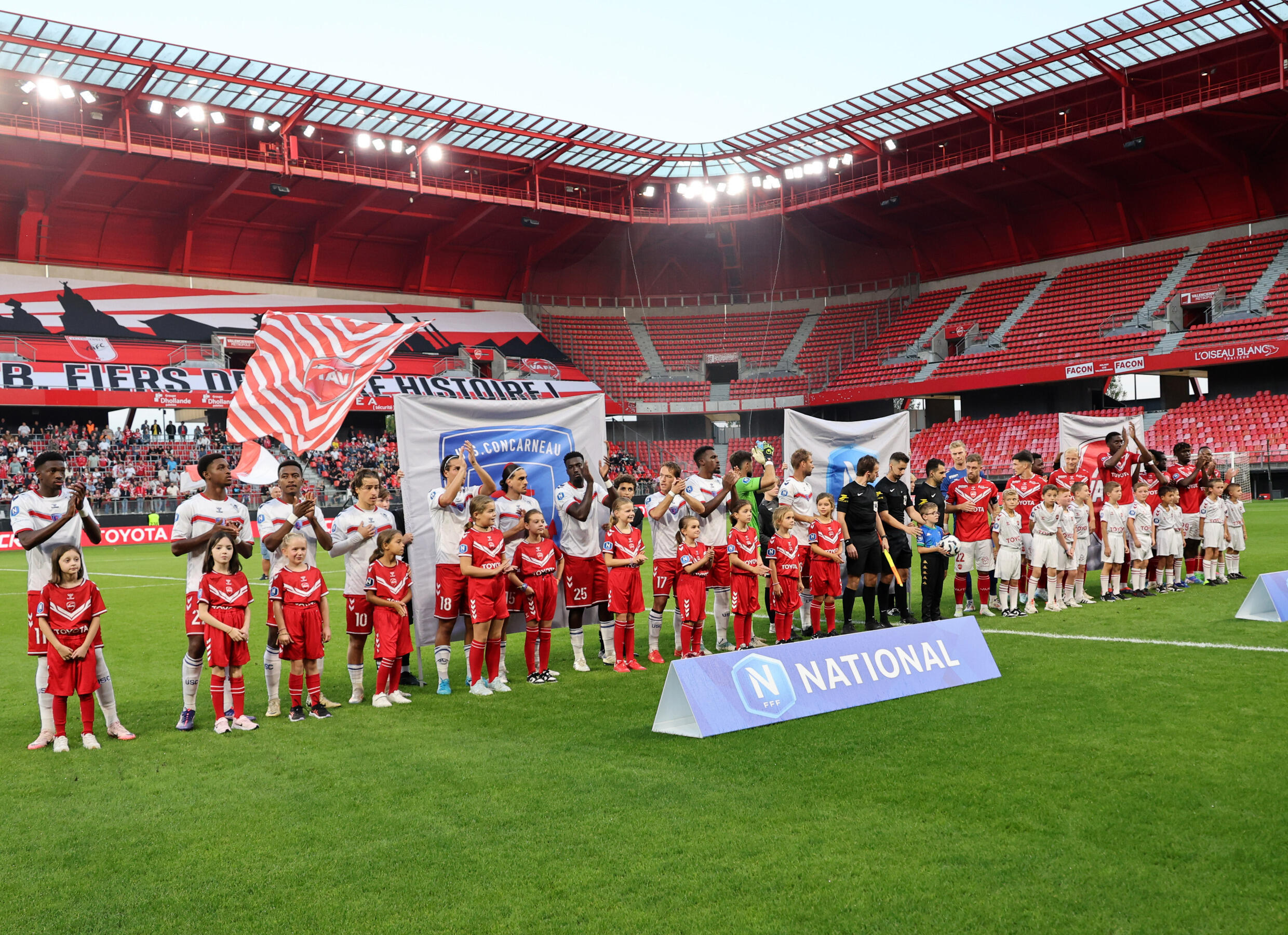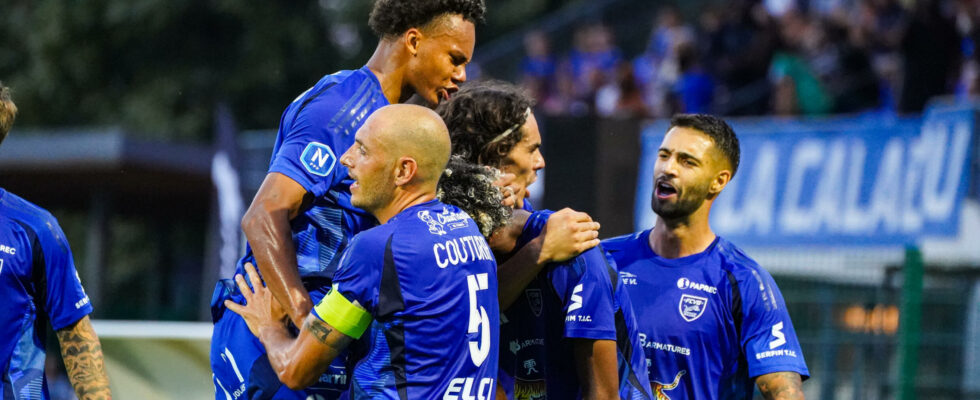The third division has never welcomed so many professional clubs. In addition, a president of the French Football Federation (FFF) who opens the door to complete professionalization. Between these two perspectives, the creation of a professional Ligue 3 in place of the amateur National is making progress. This ambitious project is requested by club leaders in this hybrid championship, but which remains fraught with pitfalls and constraints.
For more than five years, the idea of professionalizing the third French football division, the National, has been making its way through the country’s sports authorities. Unlike the United Kingdom, Germany, Spain or Italy, where the D3 is already professional, the France remains behind. With 11 professional clubs out of 17 this season, this project seems more relevant than ever. Candidate for his own succession, the president of the FFF Philippe Diallo promised “ to open the project to study the feasibility of a professional Ligue 3 “, during from an interview to The Team last September 24.
The National is a championship with contrasting realities. “ It is a division that is both amateur, according to the texts, but professional in its operation.summarizes Christophe Lepetit, sports economist at CDES (Center for Sports Law and Economics). This poses a concern for stability and economic balance with costs which can sometimes be high (salaries, organization, market and travel) and income which is sometimes a little in difficulty and which often obliges clubs to to be widely supported by local authorities », adds the one who is also a member of the control commission of professional clubs.
A two-speed championship
Off the field, National clubs suffer notable inequalities. “ We have clubs that are owned by people who have large personal fortunes and who don’t know how to count to 10, we have clubs that are owned by foreign groups and who are ready to abandon ship overnight and we have amateur clubs with presidents who count the cents to be able to finish a year », notes Philippe Terrier, president of FC Villefranche Beaujolais, who regrets this “ hybrid championship “.
FCVB has already been in the National for six years, with this amateur club status. “ Eight years ago, we had to have three professional clubs. This year we have 11explains Philippe Terrier. The championship is also completely different and we find ourselves with a diversity of operations which are quite incredible. », he adds.
For the one who has been at the head of Villefranche since 2010, “ what changes the most is the status of the players “. With a federal status, it is impossible for Villefranche to deliver the holy grail of every football player: a professional contract. “ This year, there are still four players who left, who dreamed of staying in Villefranche, but financially it was not possible. Even with an identical salary offer, they cannot stay because it would be madness on their part not to sign their first professional contract », Regrets the Rhodanian.
“ THE federal status, it’s a pro status. The Villefranche players are professionals. We must stop the hypocrisy », annoys Thierry Gomez, president of Le Mans FC, a professional club.
A championship with rights and duties that are different depending on the status you have
For this fervent defender of Ligue 3, we have “ a championship with rights and duties which are different depending on the status we have and this is not normal, there is a certain inequity which is favorable to one or the other, but it is the first subject that must be able to evolve. » The professionalization of the National, “would be the logic of things” to give the same rights to everyone.
The great financial gap
Administered by the French Football Federation, the National receives 6.7 million euros from the federation. However, “ income [des clubs] are relatively limited since there is no payment of TV rights », Explains Christophe Lepetit, the championship being broadcast for free on the FFF YouTube channel. “ Is this logical? that BeIn Sport pays 40 million euros for Ligue 2 and 0 euros for the National? When you go to see Sochaux-Dijon, Nancy-Valenciennes, Nîmes-Le Mans, we say to ourselves that the Ligue 3 plateau does not have much to envy of the Ligue 2 plateau », annoys the president of Le Mans.

Each season, amateur clubs receive 270,000 euros from the Federation. On the other hand, professional clubs are not entitled to any payment. Worse still, “ we pay a contribution to the Federation to participate in the championship, while the federal clubs do not pay any », criticizes Thierry Gomez. A sum which amounts to 12,500 euros, compared to 50,000 two years ago.
If the professional clubs freshly relegated from Ligue 2 benefit from a “ descent assistance » for two years from the LFP, their only source of income after this date is based on “ sponsorship with mainly local sponsors and subsidies which strongly depend on the policy implemented by public partners », according to Christophe Lepetit. So much unstable income.
Geographic disparities aggravate these inequalities. FC Villefranche, for example, survives thanks to a network of more than 550 partners to compensate for the low subsidies from the Auvergne-Rhône-Alpes region (6,666 euros) and the Rhône department (27,000 euros). “ Some of my colleagues receive 500 000 euros from their department. How can we justify such discrepancies? ? », asks Philippe Terrier.
“ Not the most urgent solution to implement »
Is the professionalization of the National the solution to all these ills? Opinions differ. “ We are killing the clubswarns Thierry Gomez. Economist Christophe Lepetit recognizes the fragility of the situation. There are more and more withdrawals of points, administrative demotions and an arms race which is leading some clubs to live beyond their means. »
According to him, professionalization is not a panacea. “ I do not believe in this solution which is seen as a miracle solution. I think that the supporters of Ligue 3 see two things: the possibility of being able to receive part of the TV and marketing rights and the possibility of being able to develop real training centers and hope to have transfer compensation if ever successful National players were to be transferred. »
If the latter does not see any fundamentally negative aspect to the creation of a Ligue 3, “ this may not be the most urgent solution to implement “, he says, opting for other possibilities like “ open reflection on reducing the number of clubs in the National Championships to better support them […]to have revenues that develop and that the FFF can better promote the National and devote more resources to it. »
A fragile project
Philippe Diallo’s declarations aroused hope, but also doubts. “ I hope this isn’t just an election issue. », tempers Philippe Terrier. If this project seems to have a consensus, its implementation remains strewn with pitfalls. The LFP, which manages professional football activities in France, “ doesn’t come to meetings », Regrets the president of Villefranche.
The solution of a professional championship managed by the FFF (as is the case for the women’s D1) nevertheless exists. If this Ligue 3 were to exist, “ it should be negotiated with all stakeholders: LFP, FFF, club representatives, union of professional clubs, National, representatives of players and coaches, underlines Christophe Lepetit. But today, the diagnosis is rather shared and the solutions diverge. » Especially since with the drop in the amount of TV rights, the clubs of League 1 and Ligue 2 are more reluctant to share a cake with 18 new clubs when the latter is smaller than last year.
For the president of Le Mans, “ the logic is to move towards a professional Ligue 3, period » no matter the difficulties. “If everyone puts good will into it and shows common sense, it will be resolved in three meetings whereas now, we have been meeting for three years and we have made no progress,” regrets Philippe Terrier. The National presidents will meet again in early October with one objective: “Qeu in two seasons at most, cis settled », Hopes Thierry Gomez.
